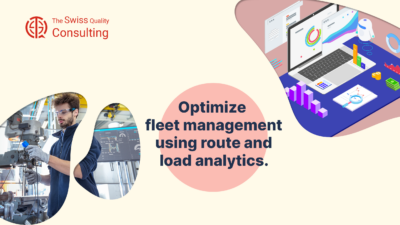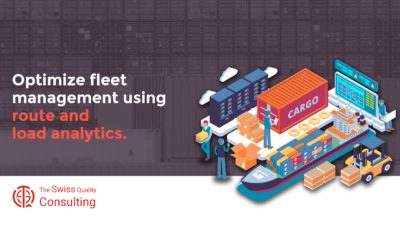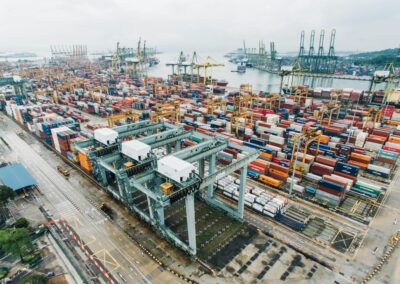Enhancing Operational Efficiency through Advanced Analytics in Fleet Management
Optimizing Fleet Management Using Route and Load Analytics has become a vital strategy for business executives, mid-level managers, and entrepreneurs in the logistics and transportation sectors. In today’s fast-paced and competitive business environment, efficient fleet management is essential for ensuring timely deliveries, reducing costs, and maintaining high customer satisfaction levels.
The Importance of Route and Load Analytics in Fleet Management
Route and load analytics transcend mere optimization; they serve as a strategic catalyst for sustainable fleet efficiency and productivity. This transformative approach leverages data analysis tools to optimize routes, allocate loads, and create a data-driven foundation for continuous improvement. By unlocking these insights, businesses can:
1. Reduce Fuel Consumption and Emissions: By optimizing routes for shortest distance and least traffic, businesses can significantly reduce fuel consumption and carbon emissions. This not only contributes to environmental sustainability but also lowers operating costs and boosts profitability.
2. Improve Delivery Times and Customer Satisfaction: Optimized routes and efficient load allocation enable businesses to meet delivery deadlines consistently and improve customer satisfaction. This enhances brand reputation, fosters customer loyalty, and drives repeat business.
3. Minimize Wear and Tear on Vehicles: Efficient routes and optimized loads reduce unnecessary mileage and strain on vehicles, leading to reduced maintenance costs and extended vehicle lifespan. This translates to long-term cost savings and increased operational efficiency.
4. Enhance Driver Productivity and Safety: Optimized routes reduce driver fatigue and stress by minimizing travel time and maximizing route efficiency. This improves driver safety, reduces accidents, and boosts overall driver satisfaction and performance.
5. Gain Real-Time Visibility and Control: Route and load analytics provide real-time visibility into fleet operations. This allows businesses to monitor driver behavior, track vehicle location, and identify areas for improvement in real-time. This enhanced awareness empowers proactive decision-making and optimizes resource allocation.
6. Foster Continuous Improvement and Innovation: Data-driven insights from route and load analytics empower businesses to identify trends, analyze performance, and continuously refine their operations. This fosters a culture of innovation and encourages the development of new strategies to achieve even greater efficiency and productivity gains.
7. Build a Sustainable and Responsible Supply Chain: By optimizing routes and reducing emissions, route and load analytics contribute to a more sustainable and responsible supply chain. This aligns businesses with environmental and social responsibility goals, enhances brand image, and attracts environmentally conscious customers.
Beyond Optimization: A Foundation for Sustainable Growth and Competitiveness:
By prioritizing effective route and load analytics, businesses unlock the true potential of a sustainable and efficient fleet operation. This strategic approach empowers them to reduce costs, improve customer satisfaction, minimize environmental impact, and ultimately achieve sustainable growth and competitiveness in a constantly evolving transportation landscape.
Embrace the power of route and load analytics and embark on a transformative journey towards a future where your fleet is efficient, sustainable, and ready to deliver exceptional results. By investing in data-driven solutions and fostering a culture of continuous improvement, you can unlock the full potential of your fleet and build a future of sustainable success for your organization.
Integrating Generative AI in Fleet Analytics
Generative Artificial Intelligence (AI) is playing an increasingly important role in transforming fleet management. AI algorithms can analyze large volumes of data related to traffic patterns, weather conditions, vehicle performance, and driver behavior. This analysis helps in creating more efficient route plans and load distributions, leading to cost savings and improved service levels.
Executive Coaching for Effective Fleet Management
Effective fleet management requires specialized skills in logistics, operations, and data analysis. Executive coaching services can help leaders in this field develop the necessary competencies to effectively manage their fleets. This includes skills in strategic thinking, decision-making, and the use of technology for operational optimization.
Effective Communication in Fleet Operations
Communication plays a crucial role in the successful implementation of route and load analytics strategies. Ensuring that all team members, from drivers to logistics planners, understand and adhere to the optimized plans is essential. Effective communication helps in aligning the entire team towards common operational goals, thereby enhancing overall fleet efficiency.
Project Management in Implementing Fleet Analytics
Implementing route and load analytics tools is a complex project that involves various stages, from selecting the right technology to training staff. Effective project management ensures that this implementation is carried out smoothly, within the set timelines and budgets. It also involves monitoring the project’s progress and making necessary adjustments to achieve the desired outcomes.
Change Management for New Fleet Technologies
Adopting new technologies and analytics tools in fleet management often requires significant changes in existing processes and mindsets. Effective change management strategies are essential to facilitate this transition, addressing potential resistance, training employees, and demonstrating the benefits of analytics-driven fleet management.
Conclusion Optimizing Fleet Management Using Route and Load Analytics
Optimizing fleet management using route and load analytics is not just about leveraging new technologies; it’s about adopting a strategic approach to fleet operations. By harnessing the power of data and analytics, businesses can achieve greater operational efficiency, reduce costs, and enhance their competitive edge in the market.
#FleetManagement, #RouteAnalytics, #LoadOptimization, #AIinLogistics, #OperationalEfficiency, #BusinessSuccess























